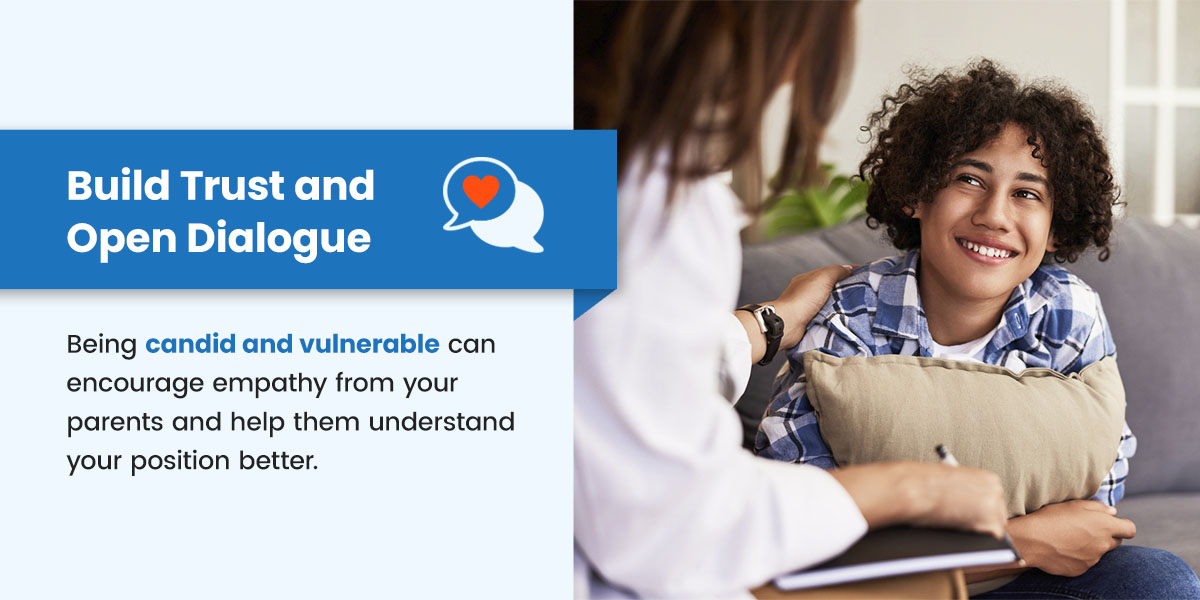Table of Contents
How to Tell Your Parents You Need Mental Help
As a young adult, it can be challenging to discuss mental health with your parents. You might be unsure how to express your feelings or be concerned about their reaction. For these reasons, finding the right words at the right time can be tricky. Know that you are not alone in this obstacle and that preparing what you want to say in advance can be immensely helpful. An open and honest discussion is the first step toward a supportive environment and feeling better.
If you are struggling with your mental health and feel like therapy could be beneficial, continue reading. Our guide will discuss how to tell your parents you want a therapist and where to go for support.
Signs You Might Need Mental Health Support
Whether you are dealing with depression, anxiety, stress or another overwhelming issue, there are signs you might benefit from mental health support:
- Mood changes like irritability, tearfulness or severe mood swings
- Sleeping too much or too little
- Drastic appetite changes
- Low self-esteem
- Spending more time alone or withdrawing from social interaction
- Academic struggles or poor grades
- Engaging in self-harm or risky behavior
- Substance use
- Having thoughts of suicide or suicidal actions
Everyone is different — even if you don’t show these signs, you know yourself best. If something feels wrong, seeking mental health support is likely a good idea. Mental health awareness is essential, and knowing you need someone to talk to is courageous.
How to Ask Your Parents to Go to Therapy
When you’re ready to discuss your feelings with parents, note that you can share as much as you feel comfortable discussing. Even if you start with a short conversation, your family will likely appreciate your honesty. Here’s how to tell your parents you need therapy:
Prepare Yourself Emotionally
Before you start the conversation, prepare emotionally. It’s common to feel nervous or overwhelmed about discussing therapy with family, especially when you are in emotional, mental or physical distress. Try relaxation techniques like deep breathing, meditation or a short walk to collect your thoughts, center yourself and reduce anxiety.
Anticipate that your parents might react with denial or other strong emotions, and prepare for these reactions to avoid confrontation. Remember that their responses or reactions don’t necessarily reflect their final feelings on the matter.
Use “I” Statements
When you’re ready to start the conversation, use “I” statements to voice your feelings and concerns. For example, you might say, “I’ve been feeling overwhelmed lately, and I think it’s important for you to know. I’m having a tough time with things in life, and I think a therapist could help me.” Using “I” statements can show that you take ownership of your feelings and experiences.
It can be hard not to blame parents or bring up things they might have done in the past, but try to keep the conversation to yourself. Focus on what it would mean for you to get the help you need. If the conversation feels tense, it’s OK to step away and try having it another time when things cool down.
Build Trust and Open Dialogue
Honesty is key. When talking to your family, share why you are considering therapy and be open about the experiences or struggles that led you to your decision. Being candid and vulnerable can encourage empathy from your parents and help them understand your position better.
If your parents say that what you describe sounds normal or that everyone sometimes feels nervous or low, let them know that your situation is more serious than that. How you feel makes you unhappy and interferes with your day-to-day life.
Address Parental Concerns
Welcome questions and concerns from your family, letting them know you are open to addressing their uncertainties or misconceptions about therapy. Encouraging questions can create a space for healthy, open dialogue. If you can’t answer every question or feel like you don’t have the right words to express your feelings, that’s perfectly fine. Just express them in the easiest and most comfortable way for you.
Offer reassurance if needed while discussing how therapy can help. Explain how therapy can help you understand the root causes of your feelings, thoughts and behaviors. They can also provide tools to feel empowered to make changes and feel better.
Seek Support From Trusted Individuals
If needed, involve a supportive friend or another family member to talk with your parents. A trusted person in your life can provide emotional support if you are feeling nervous. A counselor or school advisor might also be a great resource to mediate the conversation.
Clarify Your Needs
Some parents might not understand therapy or how it could be helpful to you. They might also feel overwhelmed because they are unsure how to help. In these cases, it can be helpful to bring up the short- and long-term benefits of seeking professional support and how it can be especially useful for teens.
For instance, you might say, “I feel unhappy, and it affects my school and friendships. I think therapy could be a great start to helping me feel better.” Emphasize that the purpose of therapy is to strengthen your mental well-being and, by extension, your relationships with them.
Be Patient
If you start a therapy conversation with your family, you should remember that their response might take some time. Work together to understand each other, being patient and open to ongoing discussions. Choose the right time and place to have your conversation, such as a quiet room in the house away from distractions and when everyone is calm.
After your discussion, give your parents space and time to process the information. Soon, they may realize therapy is a step in the right direction, and you can create a more supportive environment for your mental health.
Courageous Kids Counseling Can Support Your Mental Health Journey

It can be challenging to tell your parents you need a therapist. While some parents might feel initially confused or overwhelmed, they often come around later. Being open and honest, using “I” statements and addressing concerns can promote a supportive environment where you can be open about your struggles. When ready to start your mental health journey, turn to Courageous Kids Counseling for support. We have the education and tools you need from the start.
Our services, including teen therapy, family therapy, and online therapy, are tailored to each person’s unique needs. Our practice highly values family and support systems, and your parents can contact us anytime for additional help or resources. We can also help mediate essential conversations so you can work on mental health obstacles as a family unit.
Take the first step and contact us today. We can help you build strong family relationships and begin the path to healing.



